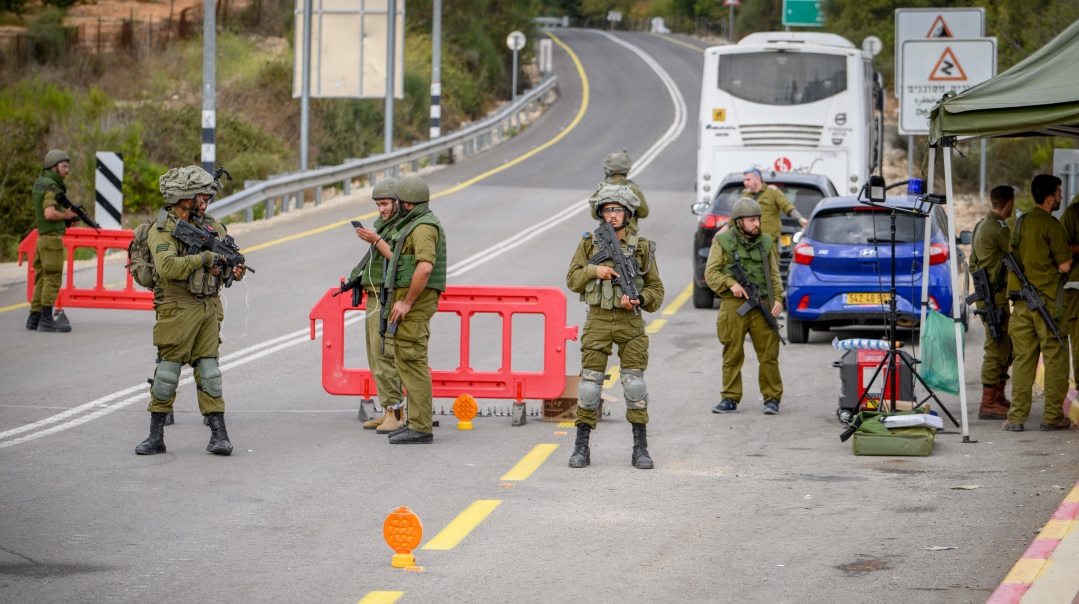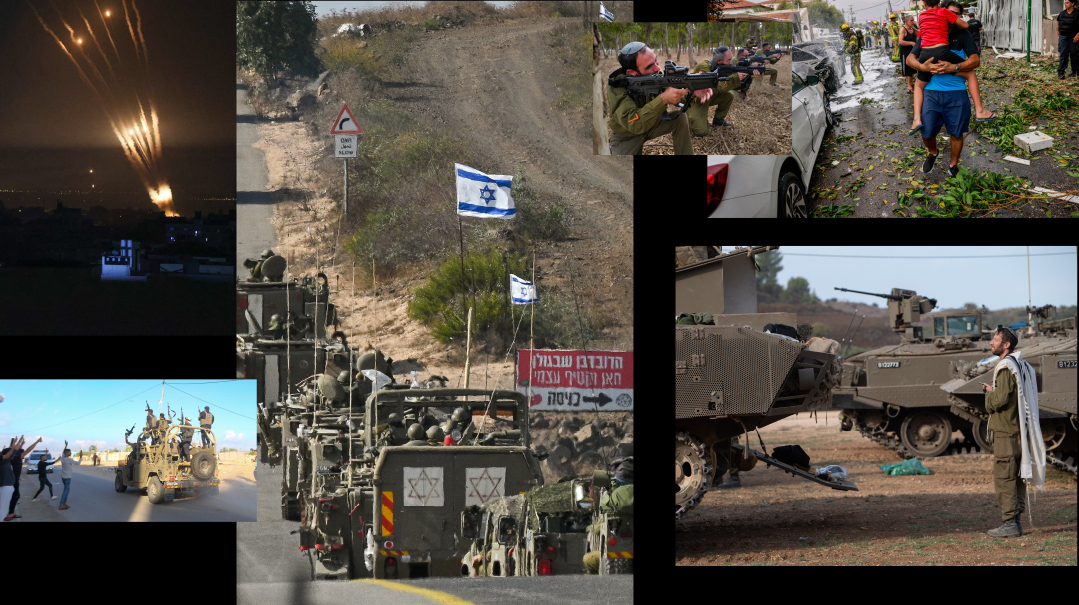Taken Captive

Hamas’s kidnapping of large numbers of civilians has raised dilemmas that Israel has never faced before

The humbling of one of the world’s foremost hi-tech and military powers by a terror group was unprecedented, but Hamas’s kidnapping of large numbers of civilians has raised dilemmas that Israel has never faced before.
Can the IDF wage total war on a fiendish enemy and hope to preserve the captives’ lives at the same time?
For years, the scenario of a mass abduction of civilians by Gazan terrorists kept Israel’s military planners awake at night. Close behind a nuclear-armed Iran was the thought that Hamas would finally succeed in their long-held goal of snatching human bargaining chips.
Israel’s enemies have always known that its sensitivity to casualties was an Achilles heel, but the Gilad Shalit deal in 2011, in which 1,000 terrorists were exchanged for one Israeli soldier, taught Hamas the full extent of Israel’s vulnerability to kidnapping.
That thinking informed the long-running Hamas tunnel-building operation. The tunnels — dug deep into Israel — were intended to facilitate raids whose shock value was second to the big prize: hauling away soldiers and civilians as pawns in the great terror game.
On Shabbos this week those fears became a living, breathing nightmare, as Hamas and Islamic Jihad terrorists dragged away approximately 150 men, women, and children to captivity in Gaza. In scenes of brutality that demonstrated the deep-seated culture of violence in Palestinian society, terrified and defenseless women and children were paraded through Gaza’s streets as the spoils of a heroic war.
The full impact of this abduction — an effort that exceeded Hamas’s wildest hopes — will become clear as Israel grapples with a war every bit as shocking as it’s ever known. On the one hand, it has made clear that when it comes to Gaza, business as usual — involving limited operation that preserve Hamas’s power — has to end.
On the other hand, Israel’s hands are tied as never before. Releasing the entire terror army in Israeli prisons is unthinkable. But so too is leaving them to the mercies of the Hamas animals. A ground invasion to topple Hamas — now long overdue — would draw unimaginable retribution on those captives.
That unfathomably-painful dilemma was on full display on Sunday, when the families of the captives held their first press conference, in which they sobbed as they pleaded with the government to do everything possible to release them. In response, Bibi Netanyahu appointed a former candidate for chief of staff, Brig-Gen. (res) Gal Hirsch, to coordinate the government approach to the subject.
As the government deals with Hamas’s game-changer, we talked to three former senior military officers about what price Israel should pay for the captives’ return, whether the country retains any leverage in this faceoff, and what it means for the IDF’s deterrence.
Gen. (res.) Avigdor Kahalani, Yom Kippur War hero and former minister
The defense establishment is facing a searing dilemma: Should they suspend the ground operation in Gaza and avoid bombarding tunnels where the captives are thought to be hidden so as not to harm them, or should they destroy Hamas abilities regardless of the captives?
“First of all, this is an unprecedented situation. In previous wars, there were captives and hostages, but the numbers were known, as were their names and identifying details. All of them were soldiers, not civilians abducted from their homes, and certainly not children, the elderly, or babies. Many hours after the fighting, we still do not know the exact number of the missing and those who were taken captive. It’s absolute chaos of a kind we’ve never experienced.
“I think that the question of whether to launch a ground operation in Gaza, and especially the timing of that entry, is unconnected to the issue of the hostages. I want to hope that the captives are in the tunnels, where they are the safest. In my view, a ground operation that includes destroying of tunnels will not endanger the captives. I think Israel will know how to destroy Hamas’s assets in a way that doesn’t endanger the captives. But that is further down the line. It’s safe to assume that there will be a need to destroy the command centers, the weapons storehouses, and other strategic targets before they can turn their attention to the tunnels.”
How do you think Israel has to handle this issue?
“Israel is in contact with Hamas through international mediators, and a prisoner exchange certainly comes into question. Israel also has captive terrorists from this infiltration, and I think Hamas deems it a top priority to keep our captives alive in order to get their captives back. Live people are worth more than bodies, and although we’ve seen the abuses and tortures inflicted by these animals, logic still wins out. They only have compassion for their interests.”
In contrast with situations in the past, when captives fell into the hands of official governments, this is a terror organization without any boundaries. Do you think there’s anyone to talk to in Hamas?
“Certainly. Gaza needs our electricity, our water, our money. Thousands of workers go out to work in Israel every day, so there are certainly people to talk to on the other side — it’s only a question of the price. It’s natural for the captives’ families to put pressure on the government, and to pay any price to get the captives back alive. The question is if we can pay any price. There is no doubt that there will be very difficult negotiations, and our starting point is not great.”
Gen. (res.) Gershon Hacohen, commander of the 2005 Gaza disengagement
As a former commander who fought in regular wars and battled Gazan terror, what is new about the latest conflict?
“Jews have always been slaughtered and murdered, in the world and in Israel, but in previous wars, we had strategic depth — in non-military parlance, ground to concede —where we could flee to. The withdrawals made in recent years have greatly reduced that depth, and therefore, we are witness to these horrific scenes. Another problem is the fact that the IDF has taken away the weapons from civilians in the border settlements around Gaza, thinking that the army would be the one to protect the citizens in an emergency. But that emergency came and the IDF wasn’t there. The civilians were like sitting ducks.”
The hostages — especially the civilians — are also a new element. How should Israel proceed?
“Yes, in contrast with the captives who fell in the Yom Kippur and Six Day Wars, these are civilians. Another problem is that the captives in the past were taken to sovereign countries, with whom it was possible to conduct negotiations. In the War of Independence, the captives of the Old City and Gush Etzion were brought to Jordan, which was under the control of the British Legion, and their condition was relatively good. The captives in Syria in 1973 suffered tremendously in captivity, but they also returned safely. This unprecedented situation, where babies, women, and the elderly were abducted to an unknown location, requires a very courageous leadership of the political echelons, with a clear order of priorities that puts the obligation of victory as the top priority.”
Do you think we need to do as Bezalel Smotrich suggested — wipe out Gaza without taking into consideration the captives that might be used as live shields?
“We need to bring the IDF to victory and then we will see what can be done with the captives. Otherwise, we will come to negotiations in a state of capitulation, which would have very severe repercussions for the country. It is impossible to conduct negotiations without first winning over Hamas. The State of Israel must not capitulate at this point, otherwise, it will be a huge humiliation. Negotiations with the mediation of a third country should also not be done at this point.”
Do you think that the captives have to be released at whatever cost, painful as it might be?
“That is easy to say, but we need to break it down to realistic details. Should Israel agree to give Jerusalem to the Arabs in exchange for captives? We all realize such a demand can’t be met. And if Israel threatens that it will kill every security prisoner in retaliation for the captives, we will not receive backing for it from the justice system or from the international community. Such declarations are no longer relevant in our times. So, what is? I don’t have an answer.
“Releasing all security captives imprisoned in Israel — or even part of them — is a very crucial and searing decision.
“With all my empathy for the terrible suffering of the captives’ families, the heavy pressure on the government to free them at all costs is damaging. I know an elderly Jew who was held captive for two years in Egypt, from 1954 until the Sinai War in 1956. During that time, his mother came to then-president Yitzchak Ben Tzvi, and asked him to work on behalf of her son. In response, the president pointed to a photo of Eli, his son who had fallen in the War of Independence, and said to her: “My son will never come back, but your son is still alive, and probably will return home. So please, sit quietly, and let the State do its job.”
Gen. (res.) Eitan Dangot, former coordinator of government activities in the territories (COGAT)
What new dilemmas does the captive situation raise for Israel?
“The first, and primary, problem is that we are facing a terrorist organization, not a sovereign state. The second thing is the sheer number of civilians, children, elderly, and women, that fell into captivity at the hands of a brutal terror group that does not heed international laws with regard to war captives. The third thing is the dilemma that these captives pose for the state with regard to decision making, and the operational plans for the IDF, how they will be affected, and so forth. The fourth dilemma is the demand to release all Hamas prisoners incarcerated in Israel, and a fifth and heartrending dilemma is pitting the families against the State.
“If in the past, the captives were soldiers, when there are civilians who are involved, abducted from their homes, including people in complex situations, the picture is very different and cannot be ignored. The sixth thing is that the state does not have the ability to get information about the hostages. It’s a problem we faced when Gilad Shalit was taken captive, and we are facing it today as well.”
Does Israel have any leverage against Hamas which could lead to the hostages’ release?
“I think Israel could have done all kinds of things to apply pressure on Hamas and for some reason, did not. Now, when this is a war in every sense, the rules have changed. They’ve stopped supplying electricity to the Strip, and I hope that in a few days, they will feel it in Gaza. On the other hand, such a situation can cause the enemy to threaten to harm our captives. Therefore, every step needs to be calculated to the best of their ability.”
(Originally featured in Mishpacha, Issue 981)
Oops! We could not locate your form.



